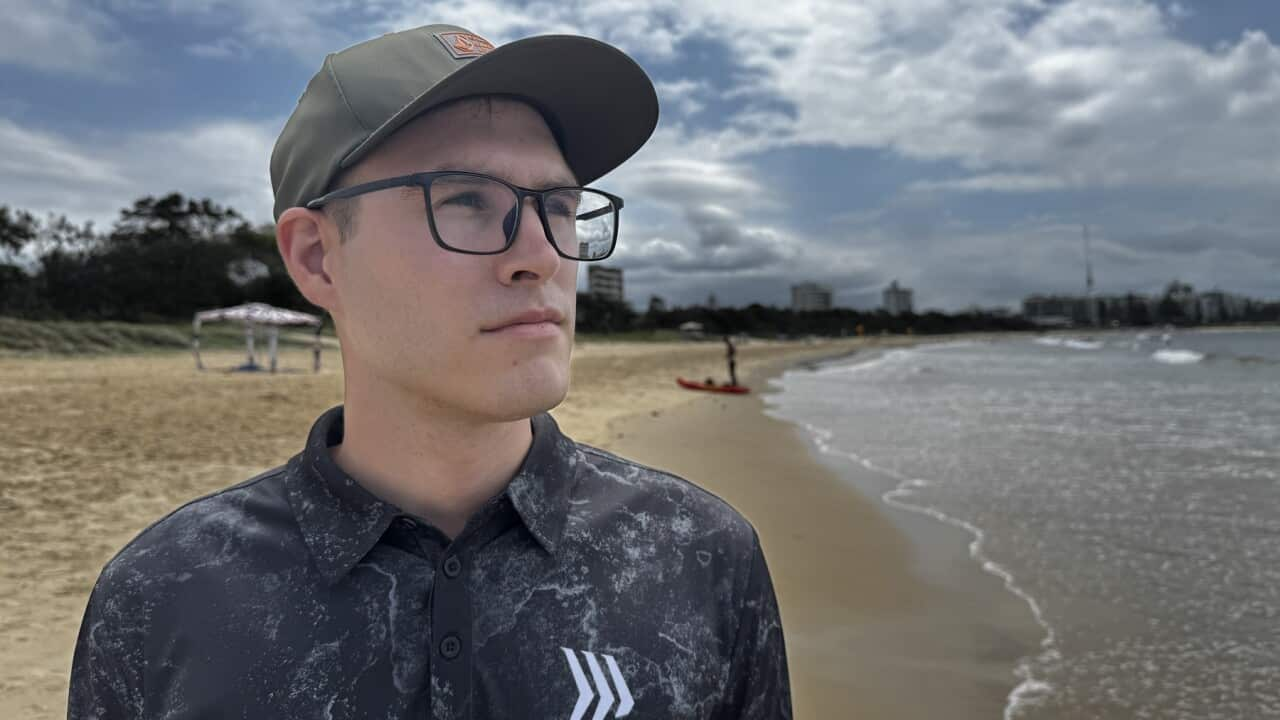TRANSCRIPT
At 27-years-old, Michael Washer was building a life on Queensland's Sunshine Coast.
By every measure he seemed healthy.
In the past year, running two half-marathons, travelling to four countries working as a software engineer and starting to plan a wedding with his fiancée, Aliesha McKillop.
But their lives have been upended by a devastating bowel cancer diagnosis.
Michael Washer: "I went to the doctor. I came in complaining that my sister had Ulcerative colitis and sometimes I get a sore tummy when I overeat, and that was basically the crux of my symptoms. I had no idea about bowel cancer at the time. When you receive a diagnosis that's terminal, my mind went to a lot of different places, but in the end, it's everyone else that's affected by it post-death let's say, and so that makes me very, very sad."
Aliesha McKillop: "There was no words originally. I almost thought it was a joke and I'm still almost in a place where I'm waiting to wake up from this bad dream."
While bowel cancer is usually found in older people over 50, stories like Michael's are increasingly common.
In Australia, cases in young adults aged 15 to 24 have gone up 266 per cent in the past thirty years.
One in nine new diagnoses is now in patients under fifty.
Findings delivered at this year's World Cancer Congress found cases in adults under fifty have gone up in 24 countries - including Australia - over the past decade.
Professor Jeff Dunn this year completed his tenure as President of the Union for International Cancer Control.
"We need to try and understand why this is happening so we can better focus on what we need to do to reverse the trend. It also is a call to action for our colleagues in primary health, our general practitioners and health service providers, to be wary about dismissing signs and symptoms of colorectal cancer in younger people. Because with these increased incidents, we need to be ever more vigilant."
This year, the federal government lowered the eligibility for free bowel cancer screening tests, with patients now able to opt in from age 45.
And receiving a free kit in the mail every two years from the age of fifty.
But some experts would like to see screening start even earlier.
Dr Penelope De Lacavalerie is a Sydney based colorectal surgeon and spokesperson for Bowel Cancer Australia.
"As a colorectal surgeon, and this is a personal view, I would love to see people having a colonoscopy much earlier than 45. I think that for the average population, early onset of bowel cancer is becoming so common, that really is not uncommon for within my community or my society to think that people should have the first colonoscopy at 40 or even 35."
Doctors say first-degree relatives of anyone who's had bowel cancer or bowel polyps should be tested earlier.
As should people with inflammatory bowel diseases like Ulcerative colitis and Chron's disease.
And those with symptoms like blood in stools, obvious bowel habit changes, unexplained weight loss, extreme tiredness or an abdominal lump or swelling.
"If we detect bowel cancer early, we can actually completely treat you and completely cure you in normal 90% of the cases. The problem is that the more it gets delayed, the later stages they become."
Experts have also stressed the importance of patient advocacy with research showing young people could spend between three months and five years - seeing multiple G-Ps before receiving a bowel cancer diagnosis.
Dr Joel Rhee is the cancer and palliative care chair at the Royal Australian College of General Practitioners.
"Many of the symptoms of bowel cancer, are also present in much, much, much more common conditions that affect a lot of people. Patients with concerning symptoms or people who are at risk should be further investigated with colonoscopy."
For now, Michael has chosen an intensive chemo treatment.
"I'm on a different chemo regime now because of self-advocacy because I would much rather fight it till the end than not deal with the side effects. You have to fight for yourself the entire way and the doctors have the best intentions at heart, but you definitely have to fight for yourself especially on something chronic like cancer, because so many doctors disagree with each other about everything from chemo to staging to which studies to use the statistics from. From the studies that I've been reading, I have maybe a 15 per cent chance of making it past here, so it's bleak, but I'm being optimistic."
Separate to his treatment, Michael and Aliesha are now settling into a new routine.
Aliesha McKillop: "We go for our morning walks along the beach in Mooloolaba before the sun gets too hot. Small things like coming and having breakfast out beside our pool with a cup of tea, and then just trying to find ways to bring our stress down.”
Michael Washer: "We'll work with the oncologist on hopefully going to Japan at some stage. It's definitely on my bucket list. We're engaged and we're getting married in April. We've taken a big break from planning that, but we've given everyone the save the date, so we'll probably focus on trying to organise that."
Aliesha McKillop: "Yeah the wedding's a big thing to look forward to.”













